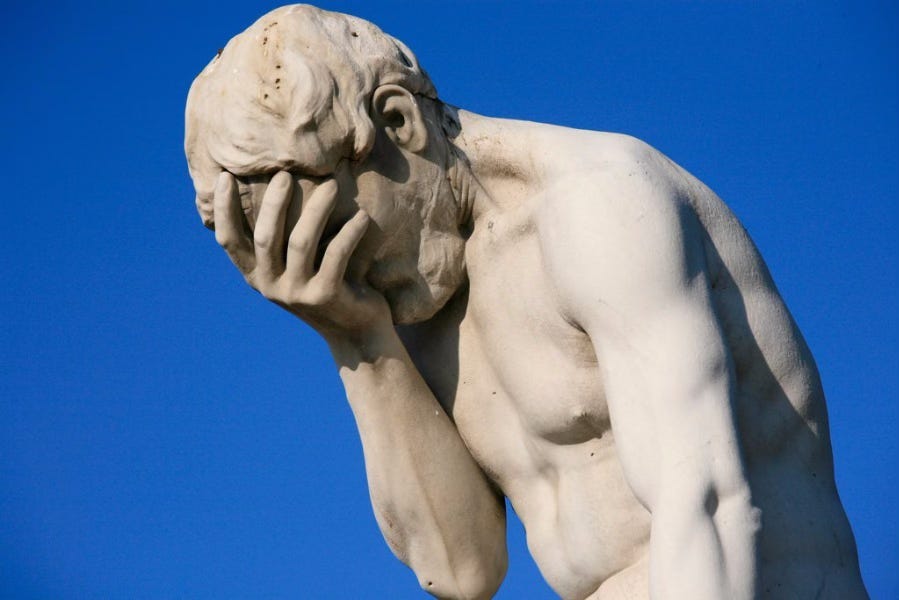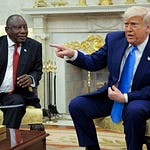
The caterpillar doesn’t try to save itself. It surrenders to transformation.
Yet tens of thousands of people around the world are working tirelessly to save a system that’s designed to transform. Whether you call it “sustainability” in corporate boardrooms or “regeneration” in activist circles, it’s fundamentally resisting the butterfly moment our civilization needs.
Twenty-six civilizations over 8,000 years. Each rose, peaked, and collapsed. Not because they failed. Because that’s the design.
It’s not a bug. It’s a feature.
Progress happens through crisis. Old forms exhaust themselves to make way for the new. Always has been this way.
George Hegel (1770-1831) called it Dialectics. He viewed history as a pattern of conflict, resolution, and advancement. Rinse and repeat. Rinse and repeat.
Another German philosopher, Johann Fichte (1762-1814) called this process thesis-antithesis-synthesis. Examples?
Dialectics in History
Scientific Revolution (16th-17th centuries)
Thesis: Aristotelian/Ptolemaic worldview based on tradition
Antithesis: Empirical observations contradicting established theories
Synthesis: Modern scientific method combining theory and observation
French Revolution (1789-1799)
Thesis: Absolute monarchy and aristocratic privilege
Antithesis: Revolutionary democracy and radical equality
Synthesis: Constitutional governance with expanded but limited rights
Industrial Revolution (Late 18th-19th century)
Thesis: Agrarian/craft economy with human and animal labor
Antithesis: Factory system and mechanization
Synthesis: Modern industrial capitalism with labor protections
Today’s Dialectic Process
Thesis: The Market, which emerged as a decentralized solution to coordination challenges, but created externalities and inequality.
Antithesis: Technofeudalism, an attempt to centralize control by Big Tech companies.
Synthesis: Mutual Coordination, which incorporates:
From markets: Decentralized participation, signaling systems, adaptability
From planning: Intentionality, collective goals, concern for externalities
While adding: Commons orientation, ecological awareness, open protocols.
The metacrisis isn’t only a combination of ecological, economic, and social tensions. It’s a tension between thesis and antithesis. History shows us a synthesis will emerge. Always.
For 8,000 years, we’ve cycled through the Dialectic Process, driven by Material Consciousness: separation, extraction, competition, domination. The “liberal me” narrative for the more recent 400 years has now served its purpose.
What comes next isn’t another “ism.” It’s a leap to Mycelial Consciousness: connection, regeneration, interdependence.
The Wall-Builders
The sustainability movement resembles the Roman Empire in its final days, pouring resources into stronger walls and bigger armies.
The walls fell anyway. They always do.
Carbon offsets, circular economy models, and green technologies? They’re well-intentioned band-aids on a system designed to complete its cycle.
What drives this “sustain Business as Usual at all costs” resistance to transformation isn’t ignorance. It’s fear of surrender. Fear of letting go. Fear of the chrysalis stage that requires dissolution before reconstruction.
I know about the fear, because I threw my life into regeneration. I was terrified of what I saw coming. But it’s a knee-jerk reaction. And it’s dumb. Until you see the thesis-antithesis-synthesis pattern.
The Seed Metaphor
Picture civilization as a seed with 8,000 years of potential.
First, invisible roots reaching through soil. Then a fragile stem breaking surface, leaves and a bud. Now, we’ve become the fully opened flower — the culmination of progress since the Industrial Revolution.
The flower doesn’t last forever; it exists in perfect, temporary beauty. What comes next isn’t failure but fulfillment — the development of fruit, the true purpose revealed.
The metacrisis — the collection of all humanity’s current woes — is not collapse — it’s destiny.
Beyond Domination
Look at Damanhur in Italy, Sekem in Egypt, or the Sarvodaya Shramadana self-governance movement in Sri Lanka, where communities have spent decades building sustainable infrastructure while developing governance models based on mutual recognition.
These aren’t isolated experiments. They’re early manifestations of what’s emerging.
Colonialism and Liberalism weren’t always the villains. They liberated us from feudalism and created unprecedented prosperity. But like all systems, they had unintended consequences and reached their limits.
For millennia, we’ve been locked in struggles where competing forces try to dominate each other. The colonizer and colonized. The oppressor and oppressed. A defeats B. Or they destroy each other. Or one subdues the other.
Through each cycle of thesis-antithesis-synthesis, the aim of the Evolutionary Impulse — mutual recognition — remained elusive.
Until now.
Different cultures, languages, traditions are coming together with a common purpose, outside of the coordination mechanism of the market. That’s the transformation already underway. The synthesis is quietly emerging.
“Another world is not only possible, she is on her way. On a quiet day, I can hear her breathing.” — Arundhati Roy
The Invitation
The question isn’t whether this transition will happen. It’s about the story we tell ourselves while it does.
Will we chase funding to “save” what’s designed to transform? Will we do what we do because we’re acting from fear?
Or will we recognize our work as midwifing humanity’s next momentous leap?
The actions might look similar. The consciousness behind them changes everything.
We’ve spent decades measuring what’s wrong — carbon levels, extinction rates, inequality metrics — while missing what’s emerging.
The human spirit craves purpose, not problems.
The metrics-obsessed activist pleads “reduce your footprint.”
The evolutionary agent whispers “discover your true purpose.”
Which invitation would you rather receive?
The Hardest Surrender
The hardest thing for achievers and problem-solvers? Surrendering to a process they can’t control.
The caterpillar doesn’t control or survive its transformation. It dissolves completely.
Our identity as “climate champions” may need to dissolve too.
Tomorrow morning, ask yourself: Am I resisting the butterfly? Or am I becoming one?
The Evolutionary Impulse is moving. The question isn’t whether we'll be affected.
It’s whether we’ll lead the way or remained trapped in our fear.
References
Georg Wilhelm Friedrich Hegel (1770-1831)
Mutual Coordination from P2P Foundation: https://wiki.p2pfoundation.net/Category:Mutual_Coordination













Share this post